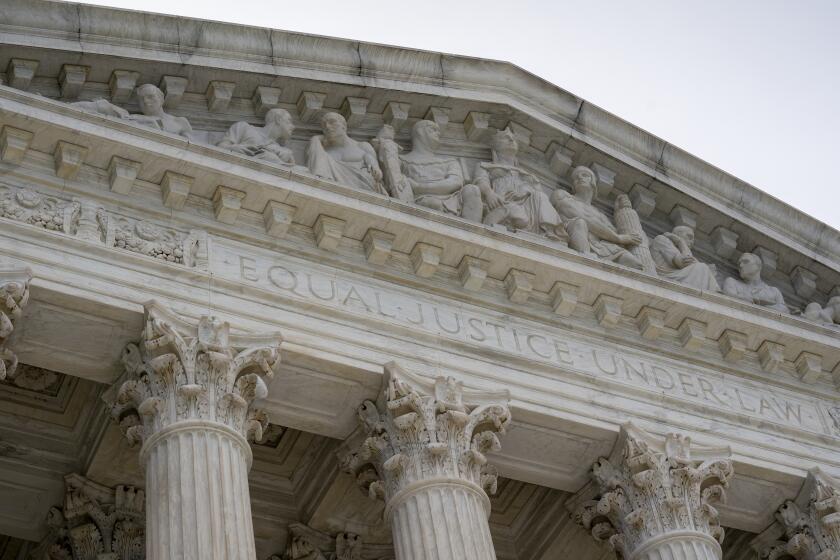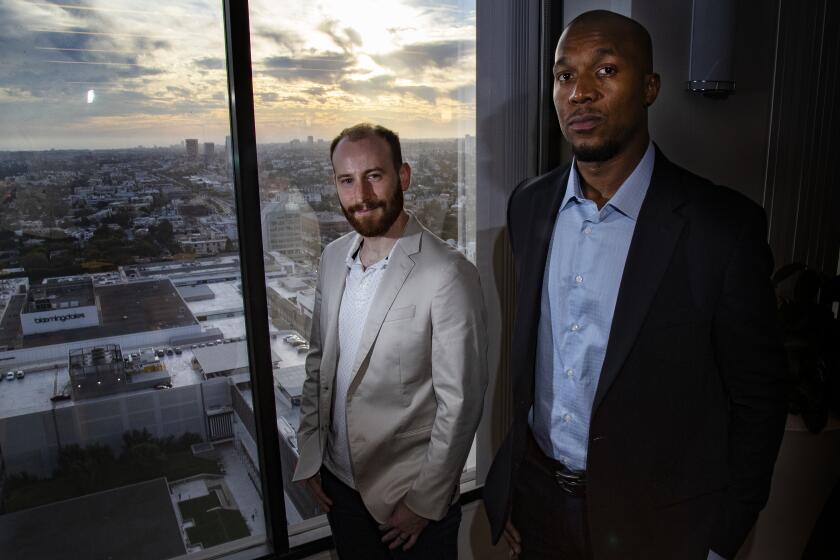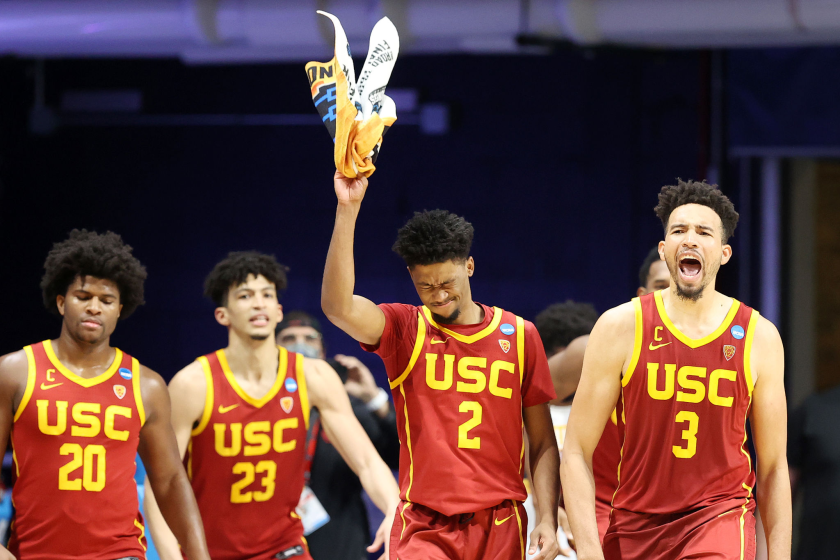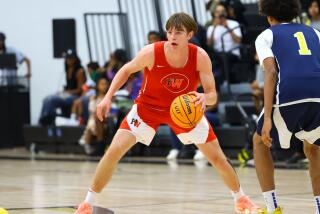Who needs senior prom or the NCAA? Overtime Elite to pay top hoops prospects to play
- Share via
Kijani Wright wouldn’t consider it. No way, not the 3.0 student who chose to attend the prestigious Windward School for academics just as much as basketball. Not the top-10 prospect who harbors dreams of playing in college and now has USC, Kansas and Stanford angling to bring him to campus in the fall of 2022.
No, Wright would not forgo his senior year at Windward and later the bright lights of March Madness for the chance to play in the Overtime Elite league, which this summer plans to start offering the world’s top prep talent an annual salary of at least $100,000 to step out of the mainstream as pioneers on a new path to the NBA.
Privately, the coaches who have groomed Wright into a tantalizing 6-foot-9 forward are skeptical he would entertain the Overtime temptation basically because, under traditional thinking, there’s too much to lose. But Wright, who will surely hear from Overtime representatives soon, is keeping an open mind.
“If that did come my way, I would take it slow,” Wright says. “You kind of see the pros and cons and weigh the opportunity cost with what you’re doing and what you’re giving up.”
Wright’s reference to “opportunity cost” shows a grasp of microeconomics that should come in handy for him. He understands that every decision has its tradeoffs, and, if he were to choose Overtime Elite, he would be giving up the opportunity that USC’s Evan Mobley, Oklahoma State’s Cade Cunningham and Gonzaga’s Jalen Suggs will soon cash in as the top three projected NBA draft picks: play one year of college basketball for the cost of an education and take advantage of intense competition that will be watched by millions, possibly turning him into a household name as a teenager.
Passing up that proven method of dream achievement would be a major risk for a prospect of Wright’s pedigree, but clearly he’s willing to do the calculation for a brand he trusts.
If you’re of a certain age bracket, you may not know Overtime, but your son, niece or grandkid probably does. Overtime is a social media giant that labels itself “the leading brand for the next generation of sports fans” with 1.5 billion page views per month and 40 million followers across its seven platforms. The company reported 88% of its audience is under 35, which is a big reason fundraising produced a fresh investment of $80 million.
Since its founding in 2016, the company has formed a direct bond with consumers, feeding sports content to the palm of their hands and harvesting data about what topics connect.
“It was pretty apparent to us early on in that journey that there is this passion point around that 16-, 17-, 18-year-old athlete,” said Zack Weiner, the co-founder and president of Overtime. “Particularly on the basketball side, that is becoming majorly influential.”
In March, just as the country began thirsting for the NCAA men’s basketball tournament, Overtime announced its Elite league, which would aim to recruit 30 players aged 16 to 18 and effectively remove them from college basketball’s future player pool.
They would be removed, of course, because NCAA rules prohibit athletes from being paid to play, and Overtime players would receive six-figure incomes while also being allowed to profit from the use of their name, image and likeness as social media influencers.
As part of this initiative, Overtime is starting an accredited high school with a teacher-student ratio of 4-1 that covers the required subjects for degree completion and emphasizes training in financial literacy and sports psychology.
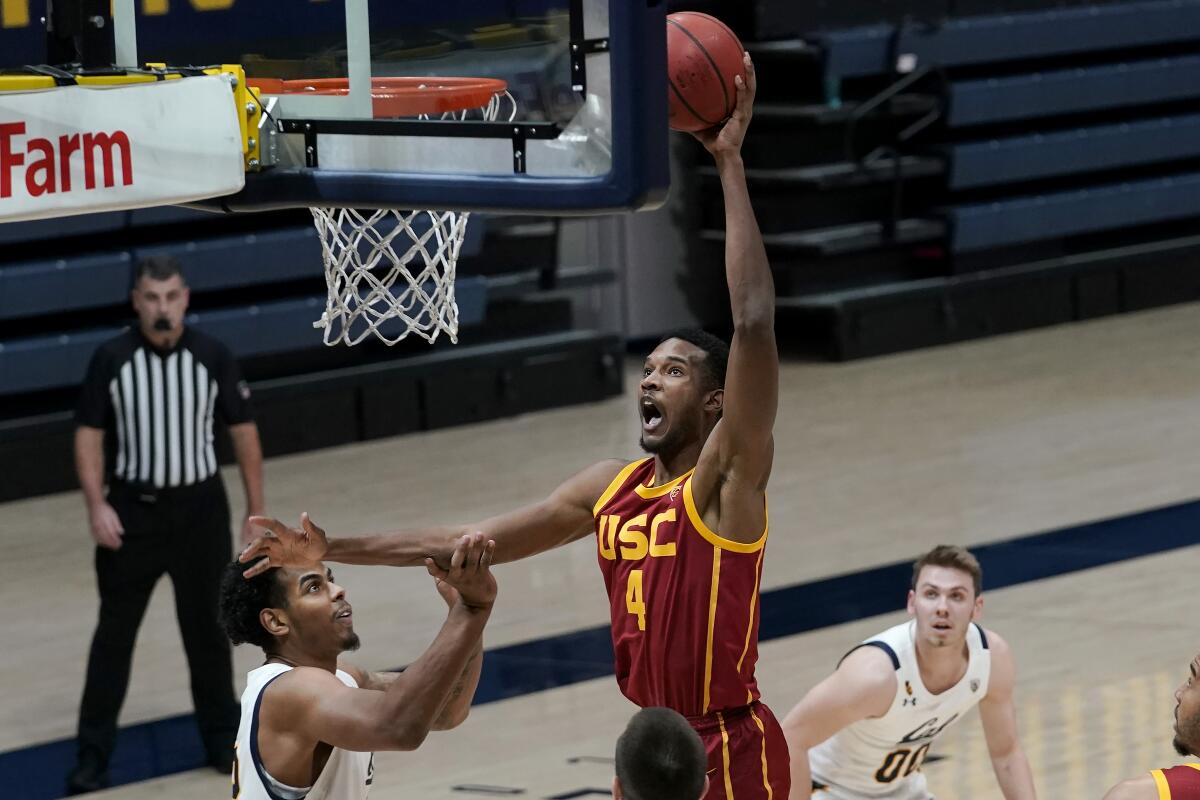
None of those perks will matter, though, if Overtime doesn’t develop prospects into players — those lucky few who get their names called on draft night.
“If you’re pulling a kid out at 16 and having them do things that a 22- or 23-year-old would do, I don’t know how that’s going to work,” said Andre Chevalier, the head coach at Sierra Canyon, which routinely fields a roster of coveted players that currently includes LeBron James’ son, Bronny James. “The people who go into it first are going to be the ones that have to deal with all the hiccups and the kinks.”
Basketball has already welcomed a new entrant to the player development ecosystem with G-League Ignite, an NBA-sponsored one-year program for players who would rather train and be compensated like pros than moonlight as college students. Jalen Green, a projected top-five pick in the 2021 draft, was the headliner of the first group, signing a contract worth $500,000. Ignite players Daishen Nix and Isaiah Todd had committed to UCLA and Michigan, respectively, before choosing the pro route late in the recruiting process.
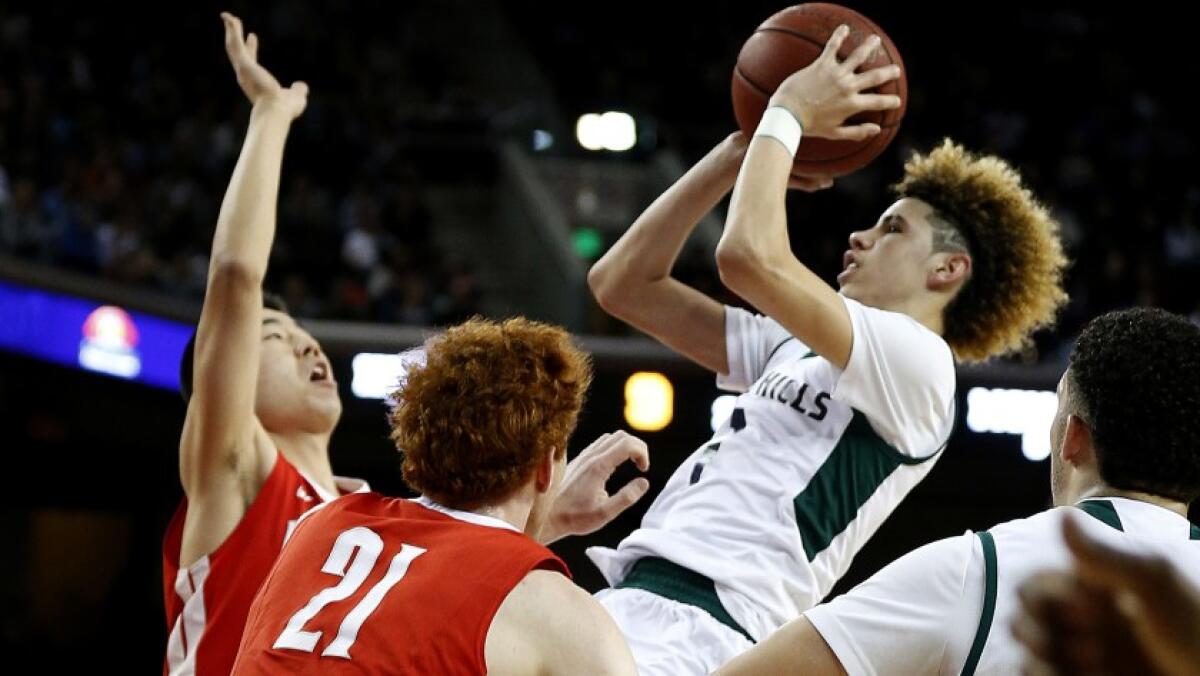
A handful of top players like LaMelo Ball have chosen to play professionally overseas as well during their gap year between high school and the NBA, which has an age minimum of 19.
But nothing has presented the potential for disruption quite like Overtime Elite.
“The tough part of them going to Overtime is they’re forgoing their high school years,” Chevalier says. “If you go and you think you made a mistake, there ain’t no going back.”
::
The seeds for Overtime Elite were planted in May 2019 when the company put on Overtime Takeover, its answer to the high school all-star circuit that has long been dominated by the McDonald’s All-American game and the Jordan Brand Classic.
“We did it in an Overtime way, created amazing content all around,” Weiner says. “We did 150 million video views. The impact of the athletes being together was like this supernova.”
Overtime then began having conversations with players and parents, trying to understand what’s working and what isn’t within the system.
The parents and players had grown tired of playing 10 games during a weekend on the AAU scene, wearing down their young bodies in the name of tournament trophies for their coaches to flaunt to their shoe company sponsors. Parents felt their sons’ education was often overlooked, particularly real-world skills like an understanding of finance and money management. Not surprisingly, the lack of a paycheck was the most consistent gripe.
“You have athletes that have influence, are very famous, and people want to watch them and experience them on and off the court,” Weiner says, “and right now there’s not really any way for them in this country to monetize that. The players and their families believe that is unjust.”
The NCAA hopes the Supreme Court will rule lower courts overstepped their role in interpreting antitrust law and protect its right to block athletes from getting compensation.
Overtime started to build its vision and, eventually, a team to implement it. Elite is run by commissioner and president Aaron Ryan, who worked for the NBA for 22 years in numerous capacities including senior vice president of marketing solutions and USA Basketball. Brandon Williams, a former NBA player who was most recently an assistant general manager with the Kings, joined Ryan as head of basketball operations.
In April, the league announced Kevin Ollie, a Crenshaw High graduate who coached Connecticut to the 2014 national championship before being fired unceremoniously due to alleged NCAA violations, as its head coach and director of player development. Thursday, Overtime announced Dave Leitao, the former head coach at Virginia and DePaul, as associate head coach.
This summer, they’ll begin pitching prep players across America. Overtime has not announced the city where the Elite venture will be based.
“I believe OTE is arriving at the right time and answering the needs of the ecosystem,” Ryan says. “The conversations we’ve had with families are exactly what’s helped us design this program in a manner that we know fits the needs for this unique set of young men who sit at the top of the pyramid, the elite of the elite.”
Ryan referred to what will be asked of these teenagers — to leave behind their traditional high school experience and the social markers that come with it — as a “sacrifice.” He quickly adjusted his word choice to “opportunity,” clarifying that Overtime wants the program to be “holistic” and provide the players with the chance to “experience the joys of being a young man, of finding your way in the world.”
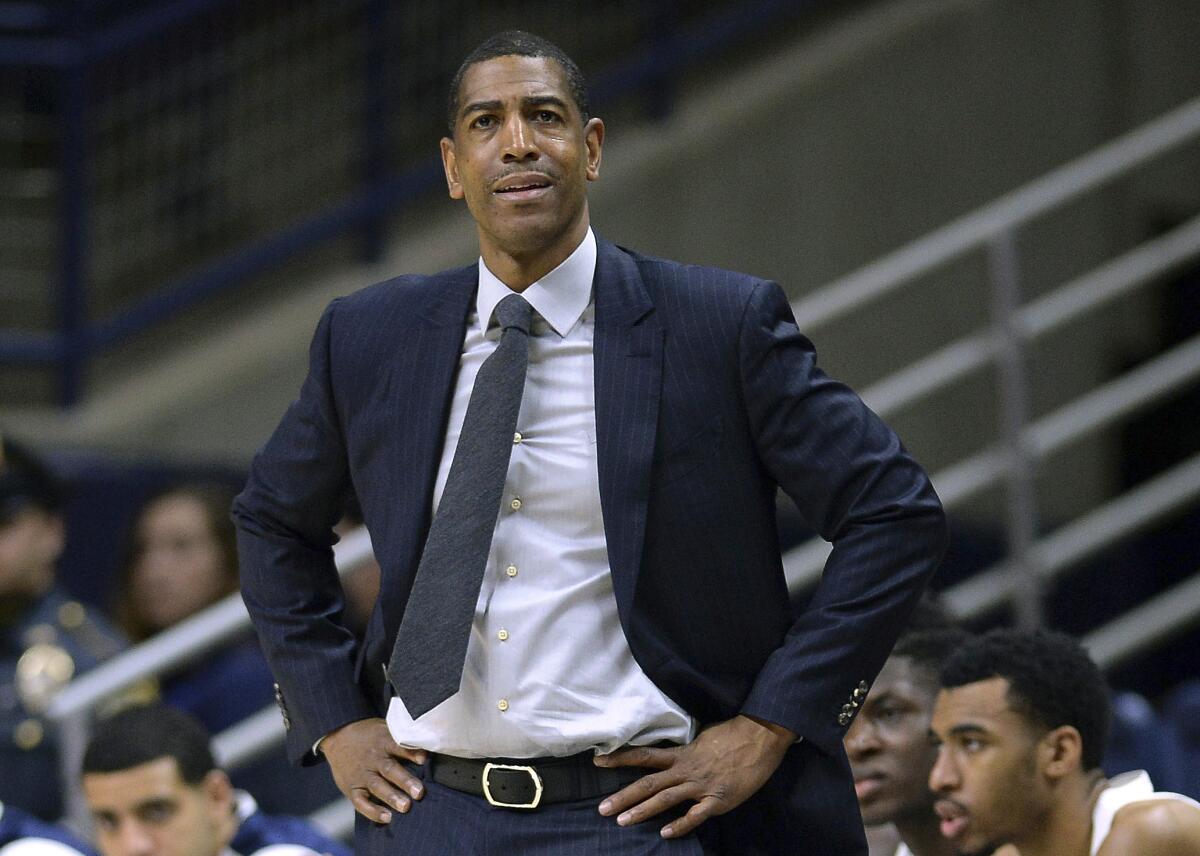
But coaches entrenched in the world of high school basketball think sacrifice is a plenty accurate term.
“This is a very fragile age for kids,” Chevalier says. “It’s when they learn and they grow, and so I don’t know if that league is going to present the opportunities for the kids to be mentored and grow at the same level that a high school program would.
“It’s the mental, psychological development that I worry about being lost the most, learning how to have tough conversations and how to interact with people, how to deal with teachers. Those things prepare you for life.”
America’s basketball development system is rooted in the paternalism of coaches and administrators who have aimed to protect talented prospects from undue influences that don’t have their best interests at heart. Many critics would say that is exactly the problem — that the model is too coach-focused.
“College to me is more about the coaches,” says Brian Shaw, the coach of G-League Ignite and former Lakers player and assistant coach. “The coaches are the ones that have the big personalities, that get the big salaries, so it’s about them and the control that they have over the players and the program. College coaches have to win in order to keep their jobs. Winning wasn’t a focus of ours [with Ignite].”
Players who go through the Overtime Elite program and maintain their status as top prospects could join G-League Ignite or play professionally overseas during their gap year before the NBA draft.
Historical Basketball League wants to offer salaries to top national and international prep players while setting them up with a clear path to higher education.
Or, if OTE graduates wanted to play college basketball but are prohibited by NCAA amateurism rules, they still could have an option with the Professional Collegiate League, formerly the Historic Basketball League.
The PCL plans to pay athletes salaries and offer them full-ride scholarships to universities stationed nearby team locations. The league just announced a media distribution deal with Next Level Sports that should position it to recruit athletes as soon as this summer, like Overtime Elite.
Now that there’s a handful of paths to the NBA that don’t involve playing in college as amateurs, what will it mean for the NCAA?
::
Isaiah Todd had the Michigan fan base atwitter when the five-star prospect committed to Juwan Howard and the Wolverines in the fall of 2019. But by the spring, when the G-League approached him about joining Ignite and he accepted, he came to represent the upcoming challenge for college coaches trying to woo the next one-and-done star to campus.
Truth was, Todd had been noticing something off about the system for years, and now he had a chance to be a part of the correction.
“The thought definitely crossed my mind as a young kid, seeing everybody else making money off me,” Todd says. “I realized when I played in a big game, a lot of people would come to the game. A light went off in my head. Why aren’t people who are the sources of the revenue being paid?”
Now having lived a year as a pro, and on the verge of becoming an NBA draft pick, Todd says he was actually thinking about how there should be a pro league for high school players before Overtime made its announcement.
“High school players are overlooked in that spectrum because they’re so young, but the reality is that basketball is a business once you become an elite player,” Todd says. “No age, no level of basketball is specified. What they’re trying to do [at Overtime] could be something big. Just seeing how they’ve grown their business from the time I was in the eighth grade, I think they have the tools and the power to do that.”
The Pac-12’s dominance in the NCAA men’s basketball tournament is helping the conference restore its credibility with a national audience.
There is no question Todd would have gained a ton of exposure by playing at Michigan, but he would also have way less money in the bank, and he would have had go through the charade of caring about classes.
While NBA scouts got to evaluate Todd’s game against pros in games that didn’t matter, Suggs, Mobley and Cunningham showed how much better they were than the entire college basketball talent pool and did it while cutting their teeth in heated competition watched by millions.
Every player will see the choice differently based on his and his family’s circumstances.
If the NCAA wants to keep future NBA stars in the spectacle of March Madness, it would do itself a favor by pushing forward with rules allowing players to profit from their name, image and likeness. But the NCAA also knows that people will watch its premier television event regardless of whether some high-end prospects each year are out of the picture.
“When I’m having conversations about the tournament, it’s often about the effort and the passion that these young men play with and folks’ allegiances to various universities,” says Ryan, the OTE commissioner. “I think that two things can be true: The NCAA is going to be fine, but also change is coming. What we’re presenting is not for everybody.”
Will it be for Kijani Wright? Someone is going to end up with the chance to mold him into a surefire NBA draft pick. Maybe it will be OTE followed by G-League Ignite or a year overseas. Or maybe he’ll stay the course with the original blueprint — Windward and the college of his choice.
While no path is set yet, he announced in April he had narrowed his list of college options to seven schools, including USC.
Wright says he has talked with Overtime, but not about joining Elite. The league says it wants to give players finishing their high school seasons the chance to do that without the added pressure of a decision.
“We’ve recently been talking about it, but we need to see what this is about,” Wright says. “It’s kind of crazy how the new age has so many opportunities to explore where you want to go with your dreams.”
More to Read
Go beyond the scoreboard
Get the latest on L.A.'s teams in the daily Sports Report newsletter.
You may occasionally receive promotional content from the Los Angeles Times.

